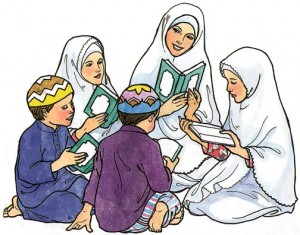Posted by Umm Sahl in Featured, Parenting, Ramadan | 4 Comments
Educating Your Children In Ramadan
 Children (who did not reach puberty) are not commanded to fast. However, their parents or guardians are strongly recommended to encourage them to fast few days so that they get used to it and they grow up knowing of the worship of fasting as they would know that of praying. In fact this was the practice of the first women of Islam who were living around the Prophet, salla Allahu alaihi wa sallam.
Children (who did not reach puberty) are not commanded to fast. However, their parents or guardians are strongly recommended to encourage them to fast few days so that they get used to it and they grow up knowing of the worship of fasting as they would know that of praying. In fact this was the practice of the first women of Islam who were living around the Prophet, salla Allahu alaihi wa sallam.
An example of that is ar-Rubayya’ bint Mu’awiyyah who reported that: “The Messenger of Allah,salla Allahu alaihi wa sallam, sent a man on the morning of the day of ‘Ashurah, to the residences of the Ansar, saying: ‘Whoever has spent the morning fasting is to complete his fast. Whoever has not spent this morning fasting should voluntary fast for the remainder of the day.’ We fasted after that announcement, as did our young children. We would go to the mosque and make toys stuffed with cotton for them to play with. If one of them started crying due to hunger, we would give them a toy to play with until it was time to eat.” [al-Bukhari and Muslim.]
Dear sisters and brothers remember that among the seven that Allah will shade under His shade on the Day of Judgment is a young man who grew up in the worship of Allah. Therefore let your children be one of these.
There are many ways to educate your children about Ramadan, the best and most important of which is to set the good example by fasting properly and behaving according to the Prophetic teachings. This is what your children will take from you first. When you are fulfilling this you can very easily [and they will accept it and practice it easily as well] teach them what you want. Here are few tips that you can use with your children [you can think of others as well]:
- Depending on their age encourage them to fast a number of days upto every other day or more for those who are almost at the age of puberty. For those who are still young let them fast a day or two and praise them in front of friends and relatives for their achievement.
- Let your children go with their father to the Masjid for Maghrib prayer and break the fast with the larger Muslim community to make them feel the greatness of fasting and the unity of Muslims in worshipping Allah.
- If your children cannot fast let them eat with you at the time of Maghrib and teach them that you are breaking the fast even if they ate before.
- Teach your children the supplication of breaking the fast
- Take your children to the Taraweeh prayer so that they get used it and know about it from their early age. They may sit or stay in the back of the prayer room if they get tired.
- Teach them to give charity. Do it in front of them and tell them you are doing it because the reward increases in Ramadan.
- Teach them to recite Qur’an regularly and inform them that the Prophet (S) used to do that in Ramadan.
- Correct them if they behave wrongly or say unacceptable words and remind them that they are fasting ot they are in Ramadan and this may alter their reward.
- Wake them up for Suhoor [even if they don’t fast] and Fajr prayer.
- Teach them to feed the people fasting and tell them about the reward for that.
- Dress them in the best clothes, give them a bath and take them with you to the Eid Prayer. Teach them that this is our feast and celebration and that christmas, easter, thanksgiving and other holidays are not ours. Stress the distinction.
It has been narrated on the authority of Ibn ‘Umar that the Prophet (May be upon him) said: Beware. every one of you is a shepherd and every one is answerable with regard to his flock. The Caliph is a shepherd over the people and shall be questioned about his subjects (as to how he conducted their affairs). A man is a guardian over the members of his family and shall be questioned about them (as to how he looked after their physical and moral well-being). A woman is a guardian over the household of her husband and his children and shall be questioned about them (as to how she managed the household and brought up the children). A slave is a guardian over the property of his master and shall be questioned about it (as to how he safeguarded his trust). Beware, every one of you is a guardian and every one of you shall be questioned with regard to his trust. (Muslim)
Source: Email

 Umm Sahl, your sister in Islam, a wife and mother of 3 beautiful blessed babies
Umm Sahl, your sister in Islam, a wife and mother of 3 beautiful blessed babies
May Allah SWT bless us with righteous children,Ameen.
[i][b]Masha allaaH
I appreciate your researches/selections in topic, its very useful topic[/b][/i]
May Allah Almighty help us all in bringing up our children in a way that they become good muslim.Amen.A great article .Subhanallah.
subhan allah a very beautiful article.May ALLAH[swt]help us all in proper upbringing of our children,ameen